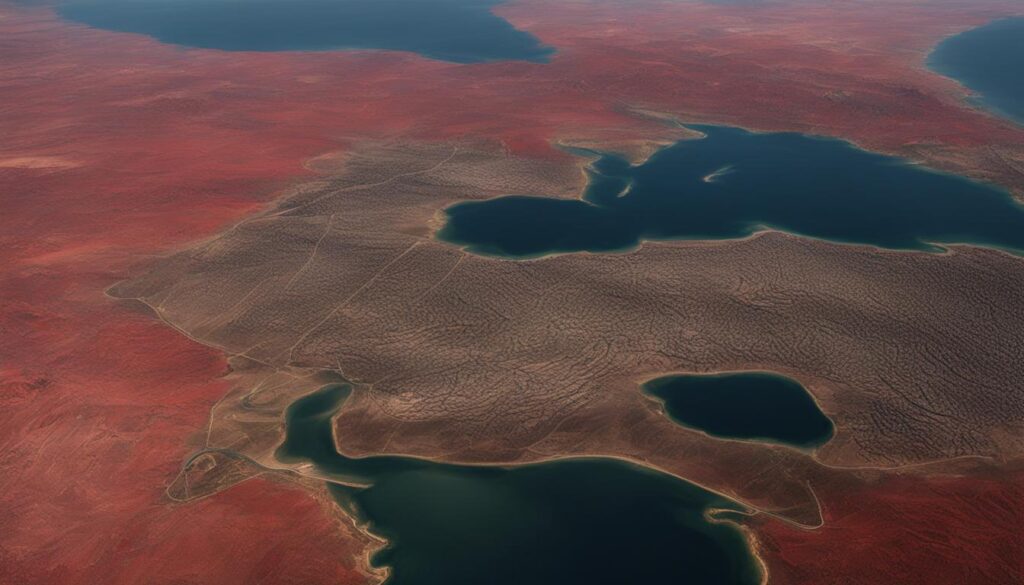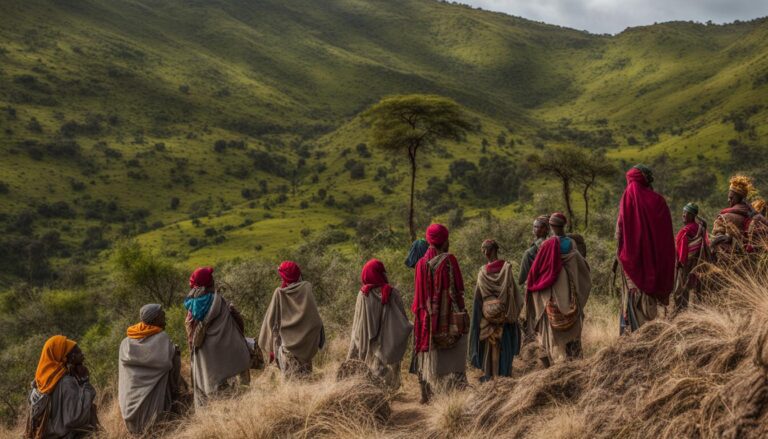How Powerful Is Ethiopia?
Did you know that Ethiopia holds a ranking of 49 out of 145 countries in terms of overall power? According to the Global Firepower (GFP) review, Ethiopia’s power index score is 0.7938, with a perfect score being 0.0000. This surprising statistic highlights the significant influence and capabilities of Ethiopia on the global stage.
From its military strength to its economic power and diplomatic influence, Ethiopia plays a pivotal role in shaping regional dynamics and has a strategic importance that cannot be overlooked. In this article, we will explore the various aspects of Ethiopia’s power, including its political strength, military capabilities, economic growth, and regional influence. Let’s delve deeper into the factors that contribute to Ethiopia’s position as a prominent player in both Africa and the world.
Key Takeaways:
- Ethiopia ranks 49th out of 145 countries in terms of overall power
- The country has a significant military strength with a large manpower pool
- Ethiopia has experienced robust economic growth and attracts foreign investment
- The country holds regional influence and plays a key role in mediating conflicts
- Geopolitically, Ethiopia’s strategic position impacts regional dynamics
Global Power Index Ranking of Ethiopia
Ethiopia’s position in the Global Firepower (GFP) Power Index highlights its relative power and capabilities compared to other nations. According to the index, Ethiopia is ranked 49 out of 145 countries, showcasing its standing on the global stage.
The GFP Power Index takes into account various factors, including manpower, airpower, land power, naval power, and financials, among others. This comprehensive assessment offers valuable insights into Ethiopia’s overall power and its ability to exert influence in the international arena.
With a vibrant and diverse economy, a strong military force, and a rich cultural heritage, Ethiopia continues to play a significant role in shaping regional dynamics and contributing to global affairs.
As we delve deeper into Ethiopia’s power and influence, we’ll explore its military capabilities, economic strength, diplomatic power, regional significance, and the support it receives from international organizations.
Manpower and Military Capabilities of Ethiopia

Ethiopia, with a population of over 116 million, is one of the most populous countries in Africa. This abundance of people provides Ethiopia with a substantial manpower pool for its military. With over 55 million individuals available for military service, the country has a significant human resource capacity.
In terms of active military personnel, Ethiopia has approximately 162,000 dedicated men and women serving in various branches. However, it doesn’t maintain any reserve or paramilitary forces.
When it comes to military capabilities, Ethiopia possesses a fleet of 72 aircraft, including fighters and helicopters. These aerial assets contribute to the country’s air superiority and combat readiness.
Beyond the skies, Ethiopia also maintains a modest number of tanks, vehicles, and artillery systems, which further enhance its military capabilities on the ground.
| Manpower | Active Military Personnel | Aircraft Fleet | Ground Assets |
|---|---|---|---|
| 55 million individuals available for military service | Approximately 162,000 active personnel | 72 aircraft including fighters and helicopters | Modest number of tanks, vehicles, and artillery systems |
Image:
Economic Power and Development in Ethiopia
In recent years, Ethiopia has emerged as a powerhouse in terms of economic growth and development. With an average GDP growth rate of over 10%, the country has made remarkable strides in establishing itself as a key player on the global stage.
One of the key factors driving Ethiopia’s economic power is its commitment to implementing economic reforms. These reforms have created a business-friendly environment that attracts both domestic and foreign investment. The government has introduced policies that encourage private sector growth and entrepreneurship, leading to the diversification of the economy.
Traditionally, Ethiopia’s economy has been heavily dependent on agriculture. However, as part of its development strategy, the country is now focused on expanding its industrial and service sectors. This shift away from agriculture has paved the way for increased job opportunities and higher income levels for its citizens.
Moreover, Ethiopia has leveraged its strategic location and natural resources to attract foreign investors. The government has implemented policies to facilitate foreign direct investment, offering incentives and support to businesses looking to establish a presence in the country. As a result, major international companies have established operations in Ethiopia, contributing to its economic growth.
Foreign investment in Ethiopia by sector:
| Sector | Amount of Foreign Investment |
|---|---|
| Manufacturing | $X billion |
| Construction | $X billion |
| Energy | $X billion |
| Tourism | $X billion |
| Information Technology | $X billion |
In addition to attracting foreign investment, Ethiopia has also received significant development assistance from international organizations such as the World Bank. The World Bank has been instrumental in providing financial support and technical expertise to Ethiopia’s development projects. Their commitment to Ethiopia’s growth is evident through a portfolio of lending operations and trust fund financing totaling $13.7 billion.
In conclusion, Ethiopia has established itself as an economic powerhouse with impressive growth rates and a commitment to sustainable development. Through economic reforms, foreign investment, and support from international organizations, Ethiopia is set to continue its upward trajectory and solidify its position as a key player in the global economy.
Ethiopia’s Regional Influence and Diplomatic Power

Ethiopia holds significant regional influence in the Horn of Africa. We have played a key role in mediating conflicts and promoting stability in the region. Prime Minister Abiy Ahmed’s efforts to establish peace with neighboring Eritrea earned him the Nobel Peace Prize.
Ethiopia’s diplomatic power is further enhanced by our strategic location and our role in regional security. As an active member of the African Union, we actively engage in multilateral diplomacy, collaborating with other African nations on various issues of regional and global importance. Our commitment to fostering peaceful relations and advancing the interests of the African continent has earned us recognition and respect on the international stage.
“Ethiopia’s diplomatic power is further enhanced by our strategic location and our role in regional security”
Moreover, Ethiopia’s foreign relations extend beyond the African continent. We maintain diplomatic ties with numerous countries worldwide and actively participate in international forums, shaping global policies and initiatives. Our diplomatic efforts focus on promoting peace, enhancing economic cooperation, and addressing regional challenges collectively.
Ethiopia’s Role as a Mediator
As a regional power, Ethiopia has a history of mediating conflicts in the Horn of Africa. Our diplomatic initiatives have been instrumental in resolving long-standing disputes and fostering reconciliation. Through dialogue and diplomatic engagement, we have successfully facilitated peace processes in countries such as Sudan and South Sudan.
Ethiopia’s Engagement in Multilateral Diplomacy
Being an active member of the African Union, Ethiopia contributes to shaping the continent’s political, economic, and social landscape. We actively participate in AU summits, forums, and committees, working collaboratively with other African nations to address common challenges, promote peace and security, and advance the continent’s development agenda.
In addition to our regional diplomatic engagements, Ethiopia maintains diplomatic missions in various countries across the world. These missions serve as crucial platforms for promoting bilateral relations, attracting foreign investment, and fostering cultural exchanges.
Ethiopia’s Regional Influence and Diplomatic Engagements
| Contributions | Examples |
|---|---|
| Mediating conflicts | Facilitating peace processes in Sudan and South Sudan |
| Regional security | Collaborating with neighboring countries to address security challenges |
| Participation in the African Union | Active engagement in AU summits and committees |
| Global diplomacy | Maintaining diplomatic missions worldwide to foster bilateral relations |
Ethiopia’s regional influence and diplomatic power play a crucial role in shaping the political and security landscape of the Horn of Africa. We are committed to contributing to regional stability, promoting peace and prosperity, and advancing the interests of our nation and the African continent as a whole.
Geopolitical Importance of Ethiopia

Ethiopia’s strategic importance and geopolitical position in the Horn of Africa make it a significant player in regional dynamics. Located centrally, Ethiopia has access to major trade routes, connecting various countries in the region. It shares borders with Eritrea, Sudan, South Sudan, Kenya, and Somalia, further enhancing its geopolitical relevance.
The stability and influence of Ethiopia have a direct impact on the political, economic, and security dynamics of the Horn of Africa. The country’s diplomatic engagements and regional interventions contribute to peacekeeping efforts and conflict resolution.
Furthermore, Ethiopia’s large population, estimated at over 116 million, and its rapidly growing economy provide it with additional leverage on the global stage. As one of the most populous countries in Africa, Ethiopia’s domestic market potential and economic opportunities attract international attention and investment.
With its central location, strategic importance, and growing influence, Ethiopia continues to shape regional dynamics and assert its position as a key player in the Horn of Africa.
Key Trade Partners of Ethiopia
| Trade Partners | Export Value (in millions USD) | Import Value (in millions USD) |
|---|---|---|
| China | 980 | 7,805 |
| Saudi Arabia | 229 | 3,116 |
| United States | 195 | 265 |
| Germany | 174 | 362 |
| Netherlands | 139 | 210 |
World Bank Support and Development Programs in Ethiopia
The World Bank plays an active role in supporting Ethiopia’s development through various programs. We focus on promoting inclusive and sustainable growth, improving access to quality services, enhancing resilience and inclusiveness, and supporting institutional accountability.
With a substantial portfolio in Ethiopia, our lending operations total $13.7 billion, and we provide trust fund financing of $979 million. The International Development Association (IDA), our fund for the poorest, serves as Ethiopia’s largest provider of official development assistance.
| Program Area | Amount (in billions of USD) |
|---|---|
| Poverty Reduction and Economic Management | 6.2 |
| Social Protection and Labor | 2.8 |
| Agriculture and Rural Development | 2.4 |
| Human Development | 1.9 |
| Transport | 0.9 |
| Water and Sanitation | 0.5 |
| Energy and Extractives | 0.4 |
The World Bank’s support in these areas contributes to Ethiopia’s efforts to achieve its development goals and improve the lives of its people. Through collaborative partnerships and targeted initiatives, we aim to create a sustainable and prosperous future for Ethiopia.
To learn more about the World Bank’s programs in Ethiopia, visit our website.
Ethiopia’s Economic Reforms and Private Sector Development
In a bid to bolster private sector development and attract foreign investment, Ethiopia has implemented comprehensive economic reforms. This strategic move by the government aims to unlock new opportunities, drive economic growth, and position the country as a key player in the global market.
One of the significant steps taken by Ethiopia is the opening up of state-owned companies in sectors such as energy, telecommunications, and air travel to foreign investment. This progressive approach not only facilitates foreign direct investment but also fosters competition and innovation within these industries.
Moreover, Ethiopia has gained invaluable support from international financial institutions such as the International Finance Corporation (IFC) and the Multilateral Investment Guarantee Agency (MIGA). These organizations play a pivotal role in supporting private domestic firms and foreign investors, offering them financial assistance, technical expertise, and risk mitigation services.
Through these economic reforms and collaborations, Ethiopia aims to create an enabling environment for private enterprises to thrive and contribute to the country’s sustainable development. The focus on economic liberalization is expected to attract diverse industries, stimulate job creation, and boost overall economic performance.
Unlocking the Potential of Ethiopia’s Private Sector
“By undertaking significant economic reforms, Ethiopia is empowering its private sector to play a central role in driving economic growth and transforming the country’s development landscape.” – Ethiopian Ministry of Finance
With a young and dynamic workforce, vast natural resources, and a strategic location, Ethiopia is well-positioned to attract foreign investment and catalyze private sector development. This presents lucrative opportunities for both local and international businesses to tap into the country’s untapped potential.
By creating an environment conducive to entrepreneurship and innovation, Ethiopia aims to diversify its economy, reduce dependence on agriculture, and enhance its global competitiveness. The government’s commitment to fostering private sector growth and attracting foreign direct investment reflects its long-term vision for sustainable and inclusive economic development.
With its growing population, expanding consumer market, and strategic geographic position, Ethiopia offers a promising investment landscape. The implementation of economic reforms and the emphasis on private sector development herald a new era of economic opportunities and prosperity in the country.
Conclusion
Ethiopia has emerged as a formidable regional power in the Horn of Africa, boasting strong military capabilities, impressive economic growth, and influential diplomatic relations. With a strategic position and active engagement in regional affairs, Ethiopia has established itself as a key player in the global arena. The country’s continuous reforms and support from international organizations set the stage for its continued rise as a significant power.
From a military perspective, Ethiopia demonstrates prowess with a sizable manpower pool and a fleet of advanced aircraft. With over 116 million people, the nation has a robust workforce at its disposal. Its military comprises about 162,000 active personnel, further boosting its defense capabilities. Additionally, Ethiopia’s impressive economic growth, averaging more than 10% GDP growth, has attracted foreign investments and positioned the country as an economic powerhouse in Africa.
Diplomatically, Ethiopia exerts considerable influence in the region. Prime Minister Abiy Ahmed’s efforts to reconcile with neighboring Eritrea have garnered international acclaim, earning him the prestigious Nobel Peace Prize. Ethiopia’s role in mediating conflicts and promoting stability within the African Union showcases its diplomatic acumen. Furthermore, the country’s geopolitical significance and central location in the Horn of Africa contribute to its strategic importance on the global stage.
In conclusion, Ethiopia’s power capabilities are multifaceted, encompassing military strength, economic growth, and diplomatic influence. With ongoing reforms and support from international organizations, Ethiopia is poised to continue its upward trajectory and solidify its position as a burgeoning power on the world map.






